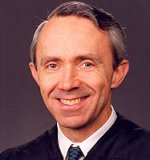6/19/2007
US Supreme Court Protects Passengers from Illegal SearchThe US Supreme Court upholds the right of automobile passengers to be free of unreasonable searches during traffic stops.

The US Supreme Court issued a ruling yesterday protecting automobile passengers from some unreasonable searches. The unanimous decision overturned a sharply divided ruling of the California Supreme Court issued last year that found passengers are not "seized" during a traffic stop. (Read California ruling)
The case began in November 2001 after a Sutter County sheriff acting on a hunch stopped a 1983 Buick Regal that had expired registration tags but a legitimate temporary permit displayed in the window. During the stop, the officer asked for the license of the driver and asked the passenger, Bruce Brendlin, to identify himself. The officer recognized Brendlin as a man wanted for parole violations. The officer then arrested the driver and Brendlin and found drugs in a search of the vehicle.
The California court argued that because Brendlin was not the one stopped, he was theoretically free to leave. That meant, they argued, that he was not "seized" and therefore Fourth Amendment protections did not apply. Justice David Souter, writing for the US Supreme Court, chastised the California justices for ignoring the clear direction given in at least four prior US Supreme Court decisions.
"We have said over and over in dicta that during a traffic stop an officer seizes everyone in the vehicle, not just the driver," Souter wrote.
All nine federal courts of appeal and "nearly every" state court have found that passengers are seized during traffic stops.
"We think that in these circumstances any reasonable passenger would have understood the police officers to be exercising control to the point that no one in the car was free to depart without police permission," Souter wrote. "A traffic stop necessarily curtails a passenger's travel just as much as it halts the driver."
The court ended its decision by arguing that the necessary consequence of the California court's position would be that police officers could conduct fishing expeditions by pulling drivers over at will in order to search passengers.
"[It] would invite police officers to stop cars with passengers regardless of probable cause or reasonable suspicion of anything illegal," Souter concluded. "The fact that evidence uncovered as a result of an arbitrary traffic stop would still be admissible against any passengers would be a powerful incentive to run the kind of 'roving patrols' that would still violate the driver's Fourth Amendment right."
Arbitrarily stopping and searching motorists is only permissible at roadblocks, according to prior US Supreme Court rulings. The full text of the final Brendlin decision is available in a 191k PDF file at the source link below.


